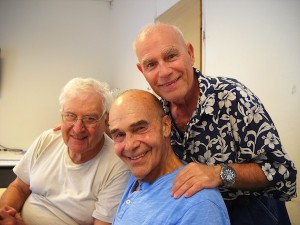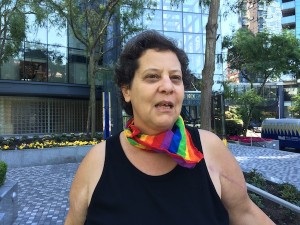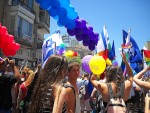Organizers estimate 180,000 people marched in the Tel Aviv Pride parade, June 12. (photo by Robin Perelle)
Alberto Lukacs-Böhm dabs a handful of birds onto the sunny sea-to-sky poster he’s painting for Tel Aviv Pride.
To live openly as a gay man in today’s Tel Aviv is to be free, he says. “It’s like to drink a fresh, clean water. That’s freedom.”
The 65-year-old is one of seven seniors gathered around a table at the Tel Aviv gay centre on June 11. The members of Golden Rainbow (Keshet Zahav) are chatting and painting as they finalize their plans to march together in the city’s 17th annual Pride parade the next day.
For Lukacs-Böhm, the path to freedom was somewhat complicated. Though he knew he was gay from a very young age, he married a woman in Hungary to avoid upsetting his mother, a circus illusionist who cried when he told her he’d kissed a boy at age 13.
He returned to Israel in 1988, the same year the country decriminalized homosexual sex. It was time, he says, “to take back my life in my hand.”
“From very young, everybody knows I’m a gay,” he explains, “[but] it was always complicated to be gay.”
“Is it still complicated to be gay?” I ask.
“Nooo,” he says, his face lighting up in an ear-to-ear smile.
“No whatsoever!”
“To speak about homosexuality or lesbian or transgender – it’s absolutely normal in Israel,” he says.
* * *
It’s day two of a five-day press trip to Israel, sponsored and entirely funded by the Israeli tourism ministry to show off Tel Aviv Pride to 43 journalists from around the world.
Day one began with an exuberant tour of gay Tel Aviv, led by Shai Doitsh, chair from 2012 to 2015 of the Aguda, Israel’s national LGBT task force. For the last decade, Doitsh has also been working with the tourism ministry and the municipality of Tel Aviv to market the city as a gay destination, a project he initiated in 2005, according to his LinkedIn profile.
Doitsh paints a rosy picture of Tel Aviv as one of the most accepting cities in the world, a year-round gay haven, where as much as 25 to 35 percent of the population may be gay, he claims.
Tel Aviv is a gay hub, both in Israel and throughout the region, he says, pausing repeatedly on Rothschild Boulevard and its surrounding streets to point out gay-friendly venues and the abundance of rainbow flags flying throughout the city for Pride.

He lists the many rights and benefits enjoyed by gay Tel Avivim, such as protection from workplace discrimination (introduced throughout Israel in 1992); the right to serve equally in the military (considered deeply important in a culture that requires military duty and prioritizes serving one’s country); the right to adopt your same-sex partner’s children (though surrogacy and marriage remain off-limits under the purview of ultra-Orthodox rabbis who frown on gay families); and Tel Aviv’s gay centre and Pride parade, both supported and funded by the municipality.
The gay community has a strong presence in Tel Aviv and in the city’s secular politics, Doitsh says.
“Our movement and our fight for equality is definitely the most successful in Israel” among the country’s minority groups, he says.
* * *
Doitsh may have a vested interest in trumpeting Tel Aviv’s gay appeal, but every gay, lesbian and transgender Israeli I’ve interviewed in the last few weeks has echoed his assessment. The city genuinely welcomes and supports its LGBT community, they say, or at least those members who more closely match mainstream norms.
It’s also a bubble that bears little resemblance to the rest of Israel, they all agree.
“Being in Tel Aviv is a bit like being in New York and pretending you see the entire United States,” says Moshe Zvi who, with his partner Eyal Alon, has joined the crowd gathering in Meir Park for the city’s Pride parade June 12.
“It’s a state within a state,” Alon says.
“I call it a bubble of sanity,” Zvi says.
Organizers tell us that 180,000 people are expected to gather in Meir Park to march in this year’s parade, making it the largest Pride in the Middle East and Asia.
As the marchers begin to file out towards Bograshov Street, Alon and Zvi tell me about some of the tensions that simmer beneath Israel’s seemingly gay-friendly surface.
Though Tel Aviv is a more liberal, secular city, Israel’s relatively small ultra-Orthodox Jewish community wields a disproportionate amount of political power in the national legislature due to the nature of Israel’s coalition politics, which rely on small-party support to pass most initiatives.
The ultra-Orthodox hold “almost a monopoly on power concerning marriage, cemeteries, conversion,” David Goldstein says.
Goldstein, 73, moved to Tel Aviv five years ago from San Francisco, fulfilling a lifelong dream. Now a member of the Golden Rainbow group, he says he feels much safer here than in the United States. But Tel Aviv is a bubble, he readily agrees.
It’s a secular city founded by Jewish businessmen who wanted a city of their own, he explains. Jerusalem, in contrast, is a holy city. Tel Aviv is anything but, he says, though it’s holy to the gay community and others who encourage diversity and a cosmopolitan lifestyle – anathema to the ultra-Orthodox community’s strictly religious worldview.
“They’re a very closed community,” Zvi says.
Being gay is “illogical in their way of thinking,” Goldstein says. “They would say, ‘Oh, I’m so sorry to hear that you’re this way.’”
Though he doesn’t consider the ultra-Orthodox mean-spirited in their anti-gay views – it’s “not the hatred that I find among [the] American right-wing,” he says – their steadfast repudiation of gay families makes life outside Tel Aviv less hospitable.
In one of Israel’s few headline-grabbing anti-gay hate crimes, an ultra-Orthodox man notoriously stabbed three people in the Jerusalem Pride parade in 2005, as protesters, mostly religious Jews, lined the route. Jerusalem Pride persists, I’m told, but it’s both more political and more tense than Tel Aviv’s cheerful take on the event.
It is getting easier to come out in other parts of Israel, Alon says. But it’s still easiest in Tel Aviv, where the ultra-Orthodox community is smaller, wields less power and seems more resigned to surrender the secular city to its wicked ways.
* * *
Then there are the more obvious, if less willingly broached, tensions.
Of course, Tel Aviv is a bubble, says Tal Jarus-Hakak who, with her partner Avital, was a lesbian feminist in Israel long before their nine-year legal battle successfully set a precedent allowing gays and lesbians to adopt their partners’ children.
Tel Aviv may be a cheerful, colorful, tolerant city with beautiful beaches, clubs, an increasingly well-established gay community with more and more families and businesses, and “an amazing, vibrant” gay culture, they say, but 60 kilometres away there is war, violence and poverty in many areas of Israel.
I’m sitting with the Jarus-Hakaks on the deck of their Vancouver home a few days after my return from Israel, a country they left in 2006 because, despite all their attempts to change its policies through protest and democratic means, they found the pace of change too slow and life there too traumatic, especially raising three sons.
Staying inside the bubble of Tel Aviv is “a survival mode,” Tal says. But it can get uncomfortable, too.
“Is that why you moved here?” I ask.
It’s hard to live outside the bubble – with consciousness – but it’s hard to stay inside the bubble, too, she says. Many people would call us traitors for saying this, she adds, but we’re not speaking against Israel. We’re speaking for Israel, to try to do things differently, she says.
Hadar Namir says she doesn’t want to go back to Israel either. One of Israel’s pioneering lesbian activists, Namir has been on vacation in Vancouver since April.
“I’m not wishing to go back,” she says. “I’m not comfortable with the human rights situation in Israel. That, for example, Arab-Israeli citizens are remote from being equal – and this is authorized by the government for years.”
Namir, who spent 15 years working with Israel’s Association for Civil Rights, draws me a map of the country. She places Tel Aviv on the Mediterranean coast, adds Haifa further north and Jerusalem about 45 minutes east, inland. Then she adds the occupied territories.

The map, unlike anything I saw during our ministry-sponsored tours of Tel Aviv and Jerusalem, fills with fences and checkpoints, until it’s a messy, convoluted ink-blot puzzle. She tells me stories of families divided, cut off from each other and their land or forced to take long detours to tend their olive trees, if they can tend them at all. She says there are different legal systems in the occupied territories: one for Jewish people accused of committing a crime and a different system for Arab people. She talks about inadequate government support for Arab cities, and difficulty accessing health care.
“Some gay men say, ‘let not interfere our fight for LGBT rights with other fights.’ Not me. I don’t believe it,” she says.
“I don’t want to simplify things,” she hastens to add. “It’s much more complicated” than good Israelis and Hamas terrorists. “And I do understand the desire for a Jewish state,” she says.
But different people have different narratives, she says: Independence Day for some is considered a disaster for others.
* * *
One commonly repeated narrative in Israel and around the world is that Arab communities kill gay people, further distinguishing Israel as a gay oasis.
Most of the Israelis I met in Tel Aviv hesitated when I asked them if gay Palestinians would be marching in the Pride parade.
There must be some gay Palestinians here, Zvi and Alon say, after a brief pause.
“I don’t think it’s easy being a gay Arab anywhere,” Zvi offers. “As in everything, I think life in Israel is easier than life in Palestine.”
Alon mentions a gay Palestinian party in Tel Aviv, and some gay-known coffee shops in Ramallah. But they’re discreet, he says.
Karl Walter, one of our tour guides, says there likely are Arabs participating in the parade, but quietly. They wouldn’t be able to go home, he tells me, “because the Arabs would kill them.”
Arabs “crush” gays in Gaza and in Ramallah, he asserts.
The reality, says Samira Saraya, is more complicated.
Saraya lives in Tel Aviv as an openly gay Palestinian woman. She is also an actress, an activist and a nurse who, in 2003, co-founded Aswat, a group for gay Palestinian women. She also attended the first monthly gay Palestinian parties in Tel Aviv.
“It’s complicated to live in Tel Aviv and be an Arab as well,” she tells me by phone, a week after my return from Israel. “Living in a kind of militaristic society…. On the other hand, I really love the people around me. But the moment we get into politics, it’s complicated.”
I ask her if Tel Aviv’s gay-friendly embrace extends to gay Palestinians.
“If you are willing to bargain your identity, if you are willing to be more Israeli, less Palestinian,” she says. “It depends.”
I ask if she has faced discrimination within the gay community.
“Of course,” she replies. She recalls one experience doing outreach to high school students with a mostly Jewish LGBT organization and hearing a fellow presenter say he wouldn’t date an Arab.
In the gay community, she says, “they don’t see that there is a connection between being oppressed for your sexual identity and your ethnic identity.”
As for the common refrain that Arabs kill gays, she says it’s too easy to paint Israel as democratic and gay-friendly against a backdrop of Arab homophobia. She says she enters the occupied territories as an openly gay Palestinian and no one has ever hurt her.
“I go as a lesbian to Ramallah, as well, and to Nazareth, and do not face homophobia or somebody cursing me because I’m a dyke.”
Palestinian society is “chauvinist and homophobic,” she says, but there are Palestinian people in the occupied territories living their lives as openly gay and nobody is killing them. Some of her friends are even out to their families, she adds.
Though Saraya says many Palestinians who live in Israel go to Tel Aviv Pride, it’s almost impossible for gay people from the occupied territories to get permission to attend. “Less and less people are permitted to come to Israel,” she says. “There are checkpoints and restrictions and protocols.”
* * *
I ask Namir what she thinks of the Israeli tourism ministry flying me and 42 other journalists from around the world to Tel Aviv for Pride.
Tel Aviv is a genuinely gay-friendly city, she says, and the municipality really does support the parade, the community centre and even a shelter for LGBT youth. “I do believe the credit is there,” she says. “I’m totally respectful that the minute that we decided to go out of the closet in 1993, they were opening the doors to us.” But it’s still “pinkwashing,” she says.
Tal Jarus-Hakak agrees. The ministry brought you over to show “the nice part of Israel, how tolerant we are,” she tells me.
It’s “part of their propaganda to show Israel as a gem in this area” – the only democratic country in this area, she says.
But Israel is the only democratic country in that area, Avital interjects.
“But even if that’s the case, it does not take off of Israel the responsibility for what it’s doing in the occupied territories,” Tal replies.
“There’s nothing wrong about the parade in Tel Aviv and nothing wrong about people coming to the parade,” Saraya says. “What’s wrong is trying to use the parade to cover the other violations that Israel do every day. This is pinkwashing.”
Zvi isn’t so sure. He doesn’t think showing off Pride necessarily detracts from the Palestinian situation. “I think mindfulness is in order,” he says, “but I’m glad people are coming to Tel Aviv. God knows Israel could use some good publicity. Should Tel Aviv not get this kind of feedback? I want tourists to come here.”
Walter, our guide, vehemently rejects any suggestion of pinkwashing.
“The thing to understand is that the gay parade and all that we’ve accomplished is for us,” he says, “not for tourism. It’s not for show. It’s not a PR stunt. It’s the most visible expression of freedom in the world – the only free gay community in the Middle East. People tend to forget that. We don’t.”
Gay rights in Israel have nothing to do with the Palestinian situation, he says. “If anyone uses the term pinkwashing, you immediately know that he’s a racist and a homophobe. He doesn’t have the decency to say that my foes – they did something good.”
Tourism ministries in other countries also show off their best traits to visitors, Goldstein points out.
He, too, finds the pinkwashing criticism unfair.
“I think the critics of Israel – they’re really against Israel to begin with,” he says. “People who have an axe to grind and [are] trying to besmirch Israel any way they can. So, any good points, they say they’re doing it to fool the people. I think it’s a bit antisemitic to say that.”
* * *
Back in the seniors’ room at the Tel Aviv gay centre, Lukacs-Böhm cheerfully cleans up his paints and prepares for another day in his gay paradise.
“For me, [to] be free is to drink cold, clean water when I want and how I want,” he says, with a smile.
Robin Perelle is the managing editor in Vancouver of Daily Xtra, Canada’s gay and lesbian news source. This story first ran on dailyxtra.com on July 2.

